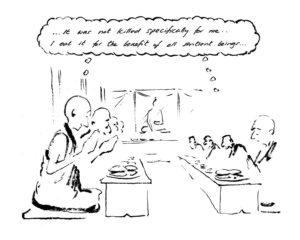The Wisdom Destroys that Notion:
The wisdom says in return: [15bcd]
Because the mind, since first coming into existence,
Has never been experienced as existing ultimately,
Who did you abide together with? [16]
Since you too are completely non-existent
From an absolute point of view,
Who is taking whose side, who is, among other things,
Defending and supporting whom? [17ab]
Go where you have to go and do not return!
That called mind has not been experienced as having a self or being established as having a self since its very first coming into existence. Yet you grasp at it as having a self and say that you have accompanied that mind since beginningless time, so with whom exactly did you abide together with simultaneously?
From the point of view of absolute existence or ultimate existence also you, the self-grasping, do not exist at all. Therefore, from the point of view of absolute existence, neither the mind nor you do exist. While you say you grasp at the mind as having a self it does not have a self.
Hence, who is taking the side of whom? Who is defending and supporting whom? You would need to take the side of a mind with a self and defend it, but such a mind does not exist. Your whole concept is unrealistic and unacceptable.
Stop talking, go where ever you have to go and do not return!
Sentient beings fell under the control of mind, and the mind in turn fell under the control of you, the self-grasping. Due to this they started to be seduced by distractions, to be attached to praise and fame, to be attached to friends and relatives, to think about these actions and activities of this life, to be attached to the side of self and have hatred for the side of other due to the unrealistic conception, and thus start fights and arguments, and to be sidetracked by the meaningless and harmful actions of this life.
In short, the one who generates all non-virtue and suffering and destroys all virtue and happiness is you alone, the self-grasping.
Since you are not experienced as existing ultimately, with whom do you exist together? Since you do not exist at all in an accurate ultimate way, who is defending whom with arguments, and who is looking after whom?
Hence, since your determined object is refuted, you are exorcised from the root. Go wherever you have to go to, and do not return!






